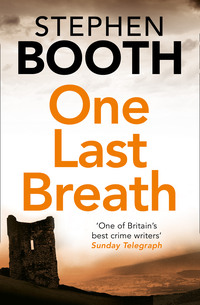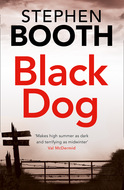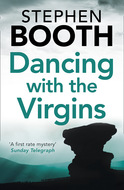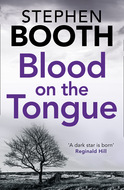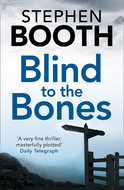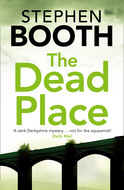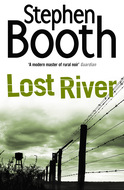Raamatut ei saa failina alla laadida, kuid seda saab lugeda meie rakenduses või veebis.
Loe raamatut: «One Last Breath»
STEPHEN BOOTH
One Last Breath

Dedicated to the men and women who explore the scariest place there is – the world beneath our feet
No book would reach this stage without the efforts of a whole team of people, and I particularly owe a debt on this occasion to my editor Julia Wisdom and the team at HarperCollins for their support. As usual, any mistakes are entirely my own.
Castleton, Derbyshire, 9 October 1990
And then she was gone. He heard the final scrape of air as it caught in her throat, and felt her last breath brush his cheek, as if a wisp of smoke had passed through the room. For a moment, she had taken his life in her mouth like a bubble of soap, swollen to bursting and smeared with light. And she’d punctured it with a sigh, that dying whisper. With one last breath, she had blown his life away.
Mansell Quinn knew he’d heard her die. He pulled his hands away from her body, and stared at the blood staining his fingers and pooling in his palms. He turned them from side to side, and watched the blood slide over a coating of white dust on his skin. It ran across his wrists and trickled into the soft flesh of his forearms, teasing the fine hairs like the caress of a fingertip.
He shook his head, trying to clear away the thoughts that buzzed in his brain like flies. He knew there were things he should do. Things he should do now. But he couldn’t remember what they were. Quinn’s mind was whirling and the room had begun to swing around him in dizzying arcs. Painful surges of adrenalin twitched in his veins, churning through his body as if poison had been pumped into his bloodstream.
The words running through his head were no help at all. Murder. The children. The knife. He knew what the words were, but couldn’t get them in the right order.
For some reason, she was wearing the lime-green sweater. A moment ago, the fabric had been stretching and twisting in his hands where it hung open over her breast. The colour of it looked garish next to the blood. But if someone had asked him what else she was wearing, he wouldn’t have been able to say. The sweater and the blood were all he saw.
Quinn sank to the floor and knelt by the body. He could feel sweat soaking from his pores and running down his face like tears. Gas bubbled in his stomach until he thought he’d be sick. He reached to pick up the knife, thinking he should put it out of her reach, hide it, throw it away, keep it safe. He had no idea which. He took her wrist between his fingers to feel her pulse, though he’d heard her die and he knew she was dead. He flinched at the touch of her skin and the slackness of her joints, and he dropped her hand back on the floor, where it landed with a thud. Then he noticed the bloody smears he’d left on her arm; they formed a pattern of red blotches and streaks, like a mark branded on an animal.
He looked up and squinted at the room, trying to place where he was. Her death had changed the world completely, so that nothing was familiar any more. Small impressions jostled his senses, like fragments of a broken picture. Music was playing somewhere, but he didn’t recognize it. A door facing him was open, but he couldn’t remember where it led. There was light coming through the doorway, yet it ought to be dark. A sweet scent hung on the air that he should know, but he couldn’t name it. It was his own house, yet it had become a place he’d never seen before. It was an alien landscape, painted in blood.
Quinn looked down at her face, and the shock hit him a second time. He felt a desperate rush of hope that it might be possible to undo everything and turn the clock back, so that nothing had happened at all. What if he’d come home a bit earlier, or later? Or if he hadn’t been held up by the roadworks on Back Street? What if he’d left his tools in the car, instead of taking his time getting the bag out and bringing it into the house, worrying about thieves going by on the road in the night, instead of what might happen in the next few minutes?
If he could take just one step back in time, her body might not be lying on the sitting-room floor, and the blood might magically fade from the carpet, like an advert for a miracle cleaner. She might stand up and laugh, and explain why she’d pretended to be dead. And life would go back to the way it had been before.
But Quinn had heard her die. The sound of her last breath had convinced him, not the sight of the blood or the slackness of her joints. And he knew his mistake had been made much earlier – years before, when he’d first met her and the whole thing had started. And now his life would never be normal again.
In a moment of silence, Quinn became aware of his own breathing. The sound of it seemed to fill the room, harsh and rapid, like the panting of a hunted animal, a rabbit in the jaws of the dog. He had never listened to his breathing before. He had never felt his lungs struggling to find air, or heard the shallow gasp that rushed across the roof of his mouth, like a cold wind inside his head. He didn’t like the noise, and he was glad when the music started again to fill the silence in the house.
What was that music? Why was it playing? Quinn nodded at someone, though there was no one else in the room. He remembered that he hadn’t found what he was looking for. The words had replaced the others in his head. He still hadn’t found what he was looking for. But he hadn’t been looking for the lime-green sweater. That shouldn’t be here at all.
Then he noticed the wetness soaking through his jeans to his knees. He stood up, staring at the purple stains on the denim, and at the blood spreading from the soles of his boots. It was so deep that it welled up from the carpet when he moved his feet.
Unsteadily, he walked round the body, praying it might look different from another angle. But all he saw now were his footprints in the blood. The carpet had been gold once – a gold shadow pattern, one of the first things he and Rebecca had chosen when they were decorating the house. She’d be upset that the carpet was ruined.
Quinn looked at his hands again, and the blood reminded him of something he should do. The phone stood on a table by the door. He dialled 999, and somehow remembered his address.
‘Yes, 82 Pindale Road. An ambulance, please.’
He tried hard to listen to the voice of the operator, though he was distracted by the metallic smell of the blood on his hand and the slippery feel of the phone in his fingers.
‘Police? Yes, probably.’
When that was done, he felt as though his legs wouldn’t support him any longer. He made it back across the carpet and collapsed into an armchair. His eyes were drawn to the clock on the wall over the mantelpiece. He knew the clock was important for some reason. He listened to its ticking, waiting for it to penetrate the fog in his brain and tell him what else to do.
Finally, Quinn remembered the most important thing of all. The children. And he should have hidden the knife. The knife was dangerous.
But then exhaustion overwhelmed him, and his head fell back against the chair. When the first police officers arrived at the house, they found Mansell Quinn asleep. He was dreaming that the whole world could hear him breathing.
1
Monday, 12 July 2004
Today was the day Detective Constable Ben Cooper was supposed to have died. For practical purposes, he was already dead. His feet and hands felt icily cold, as if death might be creeping up on him slowly, claiming his body inch by inch.
For the past half hour, Cooper had been unable to move his arms or his legs, or even his head. Mud-stained rock filled his vision, every crack and protrusion glistening with dampness in the beams of light that swung across the passage. He could smell the mud and sweat around him, and hear the splashing of water as it echoed in the confined space. The rock was so close to his face that his breath condensed on it and fell back on him as mist. It filled his mouth with its taste. The sharp taste of stone.
Cooper had never imagined that he’d feel so helpless. The roof seemed to be sinking closer towards him, pressing down to crush his skull. He could sense the mass of the hill poised overhead. One tiny movement of the earth’s crust over Derbyshire, and millions of tons of rock would flatten him where he lay. He’d be squeezed to a juice, reduced to an inexplicable red smear for future geologists to find.
‘Only a few more minutes,’ said a voice in the darkness, ‘and we’ll reach the Devil’s Staircase.’
Then the light went off the roof, and Cooper could see nothing at all. For a moment, he thought the rock had already crushed him, and he began to panic. His lungs spasmed as if there were no oxygen left for him to breathe.
Cooper felt himself tilted violently backwards, but he was strapped in too tightly to move. Looking up from this angle, he saw a cluster of yellow PVC oversuits glowing in the sporadic light. Lamps created pools of luminescence around them and distorted their shadows on the roofs and walls. But there were no faces visible in darkness.
He was jolted again. He was sure the stretcher would turn over and tip him on to the floor of the passage, where he’d drown lying helpless in two feet of muddy water. And that would be the end of his career in Derbyshire CID. He’d never expected it to be like this.
‘I want to die in the daylight,’ he said.
But no one was listening to him. As far as they were concerned, he was already dead.
* * *
Detective Sergeant Diane Fry stumbled in the middle of the floor and kicked out in irritation. She’d never thought of herself as a tidy person – there were too many messy loose ends in her life for that. And God knew, her flat was a tip; she might have been competing with the students across the landing for the pigsty-of-the-year competition. But the intrusion of someone else’s untidiness was a different thing altogether. It made her grit her teeth every time she came home from a shift. She’d barely noticed the mess when it was her own clothes thrown on the bathroom floor, but finding a pair of black jeans halfway across the room from the laundry basket reminded her that she was no longer alone.
Fry’s pager was bleeping. She checked the number, scooped up her phone from the edge of the bath and dialled.
‘DS Fry here. Yes, sir?’
Her boss at E Division, Detective Inspector Paul Hitchens, was at his desk early this morning. Yet he sounded far from alert.
‘Oh, Fry. Are you on your way in?’
‘Very shortly.’
‘OK.’
Fry waited expectantly, but heard nothing except a metallic whirring in the background, as if Hitchens were having some construction work done on his office.
‘Was there something, sir?’
‘Oh, just … Does the name Quinn mean anything to you, Fry?’
‘Quinn?’
‘Mansell Quinn.’
‘I’m sorry, it doesn’t.’
‘No. No, it wouldn’t do.’
Hitchens sounded as though his mind was on something else entirely. Fry pulled a face and gestured impatiently at the phone, as if she’d been reduced to using sign language to an idiot.
‘Well, make sure you come and see me before you do anything else, will you, Fry?’
‘Certainly, sir.’
Fry shrugged as she ended the call. It was probably nothing. Hitchens was just losing his grip, like everyone else around E Division. But she’d better not be late. There was no time for clearing up someone else’s clothes.
Hold on, though. She looked more closely at the jeans on the floor. These weren’t someone else’s clothes – they were hers, bought only a couple of weeks ago during a shopping trip to the Meadowhall Centre in Sheffield. Worse, they’d been a comfort purchase on a day when she’d been feeling particularly down. She hadn’t even found a chance to wear them yet.
‘Angie!’
There was no reply from the sitting room, where her sister lay wrapped in a duvet on the sofa. The flat was so small that the distance between the rooms was only a few feet. The fact that her sister was asleep irritated Fry even more.
‘Angie!’
She heard a grunt, and a creaking of springs as her sister stirred and turned over. Fry looked at her watch: quarter past eight. She’d better pray the traffic wasn’t too bad getting to West Street, or she’d be late.
She called again, more loudly, then picked up the jeans and tried to fold them back into their proper shape before laying them on top of the overflowing laundry basket. They were creased and scuffed across the knees, as if Angie had been crawling around the floor in them. They were hardly worth wearing now, despite the money she’d splashed out for the sake of the designer label stitched to the back pocket.
Cursing, Fry began to fuss about the bathroom, picking up more items of clothing and shoving them into the basket. She rescued a towel from the bottom of the bath and hung it on the rail. She straightened the curtains, swept up an empty toothpaste tube and a Tampax wrapper and threw them into the pedal bin. She dampened a cloth and began wiping splashes of soap off the mirror. Then she caught sight of her own reflection, and stopped. She didn’t like what she saw.
‘What’s all the noise about?’
Angie stood in the doorway wearing only a long T-shirt, scratching herself and peering at her sister through half-open eyes. Fry felt a rush of guilt at the sight of her sister’s bare, thin legs.
‘Nothing.’
‘What are you doing? I thought there must be a fire, or a burglar or something.’
‘No. I’m sorry. You can go back to sleep, if you want.’
Angie coughed. ‘I’m awake now, I suppose. Are you going out, Sis?’
‘I’m on shift this morning.’
‘Yeah. Well, I’ll get myself a coffee. Do you want anything?’
‘I don’t have time.’
Angie looked around the bathroom. ‘Tidying up? Just before you go to work? You want to slow down, Di. You’ll be giving yourself a heart attack if you get so stressed.’
‘Yeah, right.’
Angie looked at her, puzzled. ‘You were shouting me though, weren’t you? I’m sure you were. What did you want?’
‘Nothing,’ said Fry. ‘It doesn’t matter. You go and get yourself that coffee.’
Angie turned away. ‘I’m sure I heard you shouting me,’ she said. ‘You sounded just like Ma.’
Fry dropped the damp cloth and leaned on the washbasin for a moment. She listened to Angie shuffling away, her bare feet slapping on the worn tiles in the passage. Fry kept her head lowered. The one thing she didn’t want to do was see herself in the mirror again. She didn’t want the memories that had been visible for a brief moment in the reflection of her own eyes, in the hard line of her mouth and the frown marks etched into her forehead.
Reluctantly, she looked at her watch. She had to go or she’d be late, and she couldn’t afford to be late when she had to set an example for the likes of Ben Cooper and Gavin Murfin, who would go wandering off in their own directions in a second if she didn’t keep an eye on them. – Fry walked into her bedroom to fetch her jacket from behind the door. She was annoyed to see that her hand was shaking as she entered the kitchen. Angie was sitting at the table, staring at her fingernails.
‘Angie, just now, what did you mean … ?’
‘What?’
‘When you mentioned Ma. What did you mean?’
Angie shrugged. ‘Nothing really.’
‘But …’ Fry stopped, defeated. ‘I’ve got to go.’
She went down the wide flight of stairs with its threadbare treads, and left the house by the back door. Number 12 Grosvenor Avenue was one of a series of detached Victorian villas in a tree-lined street, its front door nestling between mock porticos. It had space at the back for Fry to park her Peugeot, and she was glad to be able to get the car off the street, especially when she lay in bed at night listening to the passing drunks.
Fry wound the windows down to let some air into the car. It might turn out to be one of the few days in the year when she wished she had air conditioning. She plugged her mobile phone into the cigarette lighter to make sure it would be fully charged by the time she got to West Street. Then she drove up to the corner of Castleton Road and waited for the traffic to clear. She looked at her watch again. Almost eight thirty. She might not be too late, after all.
At this point, her mind was trained to switch off anything else and start to think about work. There was plenty to do, as usual. Today’s diary included a meeting to plan an operation against Class A drug misuse and a review of a long-running rape enquiry, as well as prioritizing whatever had happened in the last twenty-four hours.
Then Fry frowned. She hated starting the day with irritations that she couldn’t classify. And she had one already this morning, thanks to the call from her DI. What was the name he mentioned? Quinn? It still meant nothing to her. But she would have to know – who the hell was Mansell Quinn?
She looked at her phone. There was one person who was sure to know. She didn’t really want to talk to him if she could avoid it, but it might be preferable to walking into the DI’s office ignorant, and therefore in a position of weakness. Ben Cooper’s number was stored in her phone’s memory, one of a hundred invisible squiggles on its smart card, so that she carried his presence with her permanently, like a scar.
From the moment she’d arrived at E Division, Cooper had been in her hair, probing into her past, turning over all the memories she’d left the West Midlands to escape. And then this business with her sister. Why had he got himself involved in that? The one thing she wasn’t going to do was give Cooper the satisfaction of asking him. It seemed impossible to Fry that there could be any acceptable explanation.
She pulled his number up out of her phone’s memory and dialled, ready to pull over to the side of the road if he answered. But the number was unobtainable. Fry grimaced in frustration. Of course, Cooper was on a rest day today. Why shouldn’t he turn off his phone and enjoy himself?
Water was pouring through the roof. Splashes of it landed on his face, making him blink. Ben Cooper tried to move a hand to wipe it away, but his arms were held too tightly. Then he felt himself travelling up a slope and saw a larger chamber, lit by artificial lights. At last there was a change in air temperature and a glimpse of daylight as the mouth of the cavern opened above him, then he heard the high-pitched cries of jackdaws.
Giving an exhausted cheer, the six men in yellow oversuits dropped the stretcher with a thump. Cooper’s head banged on the plastic cover.
‘Hey, I’m a casualty, you know. Where’s the ambulance? Don’t I get an ambulance?’
After a moment, one of the men came back to the stretcher.
‘Sorry, Ben. But you are dead, you know.’
‘My God, if I’d known it’d be like that, Alistair, I wouldn’t have volunteered. In fact, I didn’t volunteer – I was talked into it.’
Alistair Page took off his gloves and leaned over to unfasten the buckles on the straps. He was still covered in the smelly silt that coated the caves and had been stirred up from the flooded passages by the rescue party. Like the rest of the team taking part in the exercise, he was protected by elbow and kneepads, and had a heavy tackle bag slung from his belt.
Cooper tried to remember which of his friends had introduced him to Page. Whoever it was, he had a score to settle.
‘You’re not telling me you’re claustrophobic,’ said Page. ‘It’s a bit late for that.’
‘I didn’t think I was, until an hour ago. But I’ve changed my mind. I feel quite sick.’
‘You’ll be all right in a minute.’
At last, Cooper was free of the stretcher. His legs felt numb, and he had to walk up and down and shake them a bit before the painful tingling started, a sign that the blood was flowing back into his limbs. Glad to be using his muscles again, he helped Page to lift a bundle of ropes and slide them into the cave rescue vehicle, an old Bedford van that was kept in the police compound in Edendale. The van was well overdue for replacement, but the Derbyshire Cave Rescue was a voluntary group and relied entirely on donations. They’d have to raise tens of thousands of pounds before they could buy a new vehicle.
The chattering of the jackdaws made Cooper look up. The birds were circling the roofless keep of the castle on the eastern rim of the Peak Cavern gorge, hopping restlessly from tree to tree, or flapping on to the cliff ledges.
‘Do they nest on those ledges?’
‘Yes. And so do mallard ducks sometimes,’ said Page. ‘But their ducklings have a habit of falling off. Visitors don’t like that very much.’
‘I can imagine,’ said Cooper, still craning his neck. It was a relief just to be able to move his head and see the sky.
‘You did a good job of being dead, by the way. Don’t forget – you get a free tour through the show cave for doing this.’
‘I’m coming down with my two nieces tomorrow afternoon. They’ve just broken up for the summer holidays, and I promised them a day out.’
‘You can cope with that, can you?’
‘At least you don’t get many real deaths here.’
‘There’s only ever been one in Peak Cavern. That was a long time ago. And, well …’ Page hesitated, looking back anxiously over his shoulder at the mouth of the cavern, as if he heard noises in the darkness but couldn’t see what was there. ‘Well, that was different,’ he said. ‘It was unique. And a long time ago.’
Some of the rescue team were carrying their gear back to the cavers’ clubhouse in Castleton. But Page lived only a couple of hundred yards away, in one of the cottages climbing the hillside on a narrow lane called Lunnen’s Back.
‘I’ll be here between ten and five tomorrow,’ he said. ‘Just ask for me if I’m not around.’
Since it was impossible to get a car anywhere near the cavern approach, Cooper had left his Toyota in the main car park, near the new visitor centre. From there, he could see a long line of people winding their way up to Peveril Castle. The climb was gruelling, and some of the older visitors stopped to rest at every chance, pretending to admire the view while they eased the pain in their knees. As a child, Cooper had himself visited Castleton on a school outing. In term time, the streets of the town were full of children with worksheets.
In the car park, he turned his face to the sun and breathed deeply. Right now, he couldn’t imagine who or what was going to ruin his rest day.
Diane Fry knocked on the door of the DI’s office at West Street, and walked straight in. Paul Hitchens was leaning back in his chair, gazing out over the roof of the east stand at Edendale Football Club. He barely moved when she entered.
‘Sir? You said you wanted to see me.’
Hitchens was silent for a moment, lost in some thoughts of his own that he wasn’t going to let Fry interrupt. So she waited until he was ready. She watched the sunlight from his window cast shadows on his face, making him look older than the DI she’d met when she first transferred to Derbyshire Constabulary, not all that long ago. Since setting up home with a nurse in Chesterfield he’d become middle-aged almost overnight, preoccupied with finding the right wallpaper for the bathroom and tending his lawn at weekends. Hitchens himself had seemed to sense the difference, too. He was a man settling into his position in life.
But now Fry noticed him fingering the scar across the middle knuckles of his left hand, as if remembering an old injury.
‘I hear Mansell Quinn is due out today,’ said Hitchens finally.
Fry felt a surge of irritation and fought to contain it. ‘Who,’ she said, ‘is Mansell Quinn?’
The DI spun a little on his chair, glanced at Fry as if checking who she was. She had a feeling that he’d have said the same thing no matter who had walked into his office. He might have been having this conversation with the cleaner.
‘You won’t remember him, DS Fry,’ he said. ‘Quinn got a life sentence for murder some years ago. He lived in Castleton, a few miles up the road from here, in the Hope Valley. Do you know it?’
‘A tourist honeypot, isn’t it?’
‘Interesting place, actually. I went there as a kid. I remember being particularly impressed by the sheep – they came right down into the centre of the town. I suppose they must have been looking for food. I hadn’t seen one up close before.’
‘Sir?’ said Fry. ‘You were talking about somebody called Quinn …’
‘Yes, Mansell Quinn.’ Hitchens swung his chair back again and gazed out of the window. His eyes seemed to go out of focus, as if he were staring beyond Edendale to the country further north – towards Hope Valley, on the fringes of the Dark Peak. ‘Well, Castleton’s quiet most of the year, when the tourists aren’t there. People know each other very well. Quinn’s case caused quite a stir. It was a pretty violent killing – blood on the sitting-room carpet, and all that.’
Fry hadn’t been asked to sit down, so she leaned against the wall by the door instead.
‘A domestic?’
‘Well, sort of,’ said Hitchens. ‘The thing was, Quinn denied the charge at first, but entered a guilty plea at trial. Then he changed his mind again when he’d been inside for a while. He said he didn’t do it after all.’
‘A bit perverse. Did he get parole?’
‘No.’
‘He ruined his own case, then. The parole board would have thought he was in denial.’
‘It doesn’t work like that any more. Early release depends on an assessment of any future risk you might pose, not on whether you’ve accepted the court’s verdict. The Home Office makes an issue of it in its policy for lifers these days.’
‘They were forced into that, weren’t they?’
‘That’s a sore point around here, Fry.’
‘Sorry.’
‘Risk assessment,’ said Hitchens. ‘That’s what it comes down to. We know about risk assessment, don’t we?’
Fry nodded. Too often, it meant covering your back, a means of avoiding litigation or compensation payouts. But that was one thought she didn’t articulate. It might not have been what the DI meant.
‘Mansell Quinn had behaviour issues,’ said Hitchens. ‘He had to undertake anger-management training in prison.’
‘And he still didn’t get parole?’
‘No. Quinn served thirteen years and four months, until he reached his automatic release date.’ Hitchens turned round fully in his chair and leaned forward on his desk. ‘And that date is today. Mansell Quinn was due to collect his belongings and walk out of HMP Sudbury at half past eight this morning.’ Hitchens looked at his watch. ‘Half an hour ago, in fact.’
‘So?’
‘Quinn will be on licence. He’s supposed to move into temporary hostel accommodation in Burton on Trent, and he has an appointment with his probation officer this afternoon. One of the conditions of his licence is that he stays away from this area. We’ve been asked to keep an eye out for him, in case he breaches his conditions.’
Fry shrugged. ‘So what if he does turn up here? Sometimes prisoners get a bit over-excited about being out and decide to celebrate. We might find him in a pub somewhere, but it will mean nothing.’
‘Probably.’
She straightened up to leave the DI’s office. But then Fry hesitated, feeling there might be something more that he hadn’t told her.
‘Anger management? So Quinn is a violent man, would you say, sir?’
‘No doubt about it,’ said Hitchens. ‘He has a long history of violent incidents in his past. In fact, he got knockback early in his sentence because he assaulted a fellow prisoner. He broke the man’s arm and removed a couple of his teeth. And he couldn’t explain why he did it. Or wouldn’t.’
‘And what about the original murder?’
‘Well, there was certainly enough blood at the scene. The place was like an abattoir. Not what you’d want your sitting room to look like – especially in your nice new three-bedroom detached house in Castleton. Pindale Road, that was the place.’
Fry settled back against the wall with a sigh. ‘What happened exactly?’
‘Well, it seems that Quinn had made his way home from the pub, where he’d been drinking with his mates all afternoon. There was a row; he lost his temper, grabbed a handy kitchen knife … And bingo – a body on the floor, blood on the shag-pile, and the suspect still on the premises when a patrol responds to the 999 call. Terrible scenes with the kids arriving home. The whole street hanging out of their doors to see what was going on and generally getting in the way. All the usual mess. The victim was dead at the scene. She had multiple stab wounds to her body.’
‘An ordinary domestic, then,’ said Fry, irrationally disappointed. ‘One like thousands of others. I suppose the reasons for the argument might vary a bit, but the choice of household object doesn’t usually show much imagination. And it’s always the wife who ends up dead on the floor.’
‘Except there was one big difference in the Quinn case.’
Fry lifted her head.
‘What?’
‘The body on Quinn’s sitting-room floor,’ said Hitchens. ‘It wasn’t his wife’s.’
